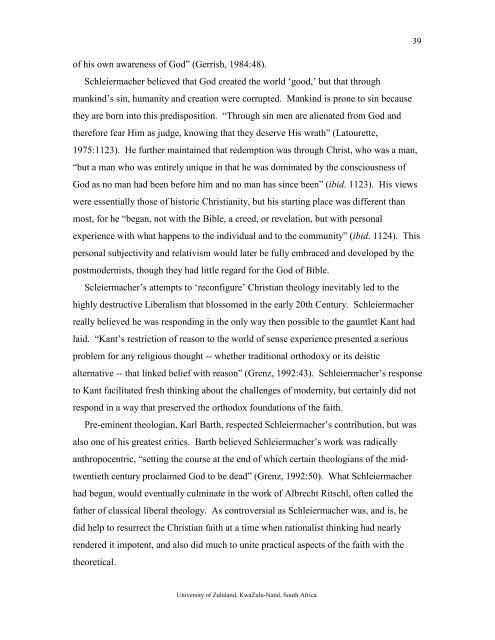Haase_UZ_x007E_DTh (2).pdf - South African Theological Seminary
Haase_UZ_x007E_DTh (2).pdf - South African Theological Seminary
Haase_UZ_x007E_DTh (2).pdf - South African Theological Seminary
You also want an ePaper? Increase the reach of your titles
YUMPU automatically turns print PDFs into web optimized ePapers that Google loves.
39<br />
of his own awareness of God” (Gerrish, 1984:48).<br />
Schleiermacher believed that God created the world ‘good,’ but that through<br />
mankind’s sin, humanity and creation were corrupted. Mankind is prone to sin because<br />
they are born into this predisposition. “Through sin men are alienated from God and<br />
therefore fear Him as judge, knowing that they deserve His wrath” (Latourette,<br />
1975:1123). He further maintained that redemption was through Christ, who was a man,<br />
“but a man who was entirely unique in that he was dominated by the consciousness of<br />
God as no man had been before him and no man has since been” (ibid. 1123). His views<br />
were essentially those of historic Christianity, but his starting place was different than<br />
most, for he “began, not with the Bible, a creed, or revelation, but with personal<br />
experience with what happens to the individual and to the community” (ibid. 1124). This<br />
personal subjectivity and relativism would later be fully embraced and developed by the<br />
postmodernists, though they had little regard for the God of Bible.<br />
Scleiermacher’s attempts to ‘reconfigure’ Christian theology inevitably led to the<br />
highly destructive Liberalism that blossomed in the early 20th Century. Schleiermacher<br />
really believed he was responding in the only way then possible to the gauntlet Kant had<br />
laid. “Kant’s restriction of reason to the world of sense experience presented a serious<br />
problem for any religious thought -- whether traditional orthodoxy or its deistic<br />
alternative -- that linked belief with reason” (Grenz, 1992:43). Schleiermacher’s response<br />
to Kant facilitated fresh thinking about the challenges of modernity, but certainly did not<br />
respond in a way that preserved the orthodox foundations of the faith.<br />
Pre-eminent theologian, Karl Barth, respected Schleiermacher’s contribution, but was<br />
also one of his greatest critics. Barth believed Schleiermacher’s work was radically<br />
anthropocentric, “setting the course at the end of which certain theologians of the midtwentieth<br />
century proclaimed God to be dead” (Grenz, 1992:50). What Schleiermacher<br />
had begun, would eventually culminate in the work of Albrecht Ritschl, often called the<br />
father of classical liberal theology. As controversial as Schleiermacher was, and is, he<br />
did help to resurrect the Christian faith at a time when rationalist thinking had nearly<br />
rendered it impotent, and also did much to unite practical aspects of the faith with the<br />
theoretical.<br />
University of Zululand, KwaZulu-Natal, <strong>South</strong> Africa

















